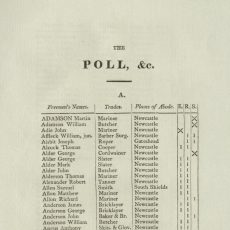May
1734
Bristol
Contested
GENERAL ELECTION
Poll book data from:
Citation: A list of the freeholders and freemen… (Bristol: Felix Farley, [1734])
Source: John Sims (ed.), A Handlist of British Parliamentary Poll Books (Leicester, 1984); Jeremy Gibson and Colin Rogers (eds.), Poll Books, 1696–1872: A Directory of Holdings in Great Britain (4th edn., Bury, 2008).
Timeline & Key Statistics
Contexts & Remarks
Dates: Wednesday 15 May-Friday 24 May 1734.
Poll book reference: A list of the freeholders and freemen... (Bristol: Felix Farley, [1734]).
Felix Farley, the printer, included an extensive erratum: 'This being done is so great a Hurry, as not to admit of Time to get Information of Errors, or of comparing each Sheet with the Original as it was ready for the Press'.
Candidates: Sir Abraham Elton (Whig); Thomas Coster (Tory); and John Scrope (Whig).
Sir Abraham Elton, a Dissenter elevated to the baronetage for his services during the 1715 Jacobite uprising, had been elected as MP for Bristol in 1722. He was described as 'a pioneer of its brass foundries and iron foundries, and ... owner of its principal weaving industry, as well as of its glass and pottery works, besides largely contributing to the shipping of the port'. His business ventures were also linked with the trade in enslaved peoples, as the Annals Of The Elton Family recounted that, 'His profits ... from making up shipments of those goods most attractive on the Gold Coast [of Africa] in return for slaves ... were enormous'.
John Scrope had been elected for Bristol in 1727. He also filled the roles of Secretary to the Treasury and recorder for Bristol. However, his vote for the excise bill (to impose a tax on a wider range of products) against the instructions of Bristol's corporation made him an unpopular candidate.
Thomas Coster was an industrialist, owner of Upper Redbrook copper works in Bristol, with additional interests in copper and tin mining in Cornwall.
Elton and Coster were returned at the end of a violent election. Bristol corporation petitioned on behalf of Scrope against Coster, claiming that the Tory had been returned by votes from 'great numbers of persons who received alms and charities and others who had no right to vote'. In preparation for the hearing, a copy of a different poll book, An alphabetical list of the freeholders and burgesses... (London, 1734), now held at the British Library, includes hundreds of manuscript marginal notes on why voters were not duly qualified, ranging from them being a 'Roman Catholick' to having been 'burnt in the hand for robing Jonathan King Esq'. In total, 453 voters were marked as unqualified. However, the petitioners struggled to carry their point and ultimately withdrew the petition.
According to Lady Cowper, Scrope was 'very angry with Sir Robert [Walpole] for making him give up... Sir Robert saying he would not espouse his cause. Sir Robert's friends say that the mob are so exasperated against Mr. Scrope for having voted for the excise that they are resolved not to have him there and if he carried his petition were determined to rise and stone his friends' (Lady Cowper's diary, 24 Apr. 1735, Cowper [Panshanger] Mss, Herts. RO).
Cultural Artefacts
Poll Book
Below is a digitised version of the poll book for this election:
.jpg/square/230,230/0/default.jpg)



